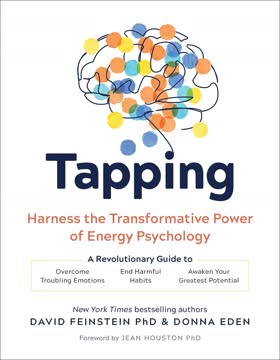Key Takeaways
1. Tapping Reprograms Neural Pathways to Transform Guiding Models
Stimulating acupuncture points (acupoints) by tapping on them while activating pertinent thoughts and feelings puts you at the keyboard as you reprogram the neural pathways that impact the quality of your life.
Internal blueprints. Our lives are governed by "guiding models"—internal representations of reality shaped by temperament, culture, and experiences. These models, often unconscious, direct our thoughts, feelings, and behaviors, acting as our personal GPS. When outdated or flawed, they can hold us back.
Targeted reprogramming. Tapping on specific acupoints sends tiny, potent electrical signals to the brain. When combined with activating relevant thoughts or feelings, these signals directly impact neural pathways. This process allows us to consciously modify these deep-seated models, moving beyond self-defeating patterns.
Transformative shifts. This unique combination of language, imagination, and acupoint stimulation creates a powerful triad for self-improvement. It can dismantle old models, like a fear of success or a belief in being sabotaged, and embed new, empowering narratives, leading to profound personal evolution.
2. The Basic Tapping Protocol Offers a Potent, Accessible Self-Healing Framework
While tapping protocols like EFT are deceptively simple, they are also surprisingly potent.
Simple yet powerful. The Basic Tapping Protocol is a straightforward, 12-step process designed for self-application, making it accessible to millions. It involves four phases: Preparation, The Tapping Cycle, Adjusting the Protocol, and Testing Your Results. This systematic approach can address a wide range of emotional and behavioral challenges.
Core mechanics. The protocol combines focusing on a specific issue (e.g., an uncomfortable memory) with tapping on a sequence of 12 acupoints. Key elements include:
- SUD (Subjective Units of Distress) ratings: To quantify emotional intensity.
- Reminder Phrases: To keep the issue active.
- Acceptance Statements: To foster self-compassion.
- Integration Procedure: A brief sequence of physical and mental actions to balance brain energies.
Rapid shifts. This method helps process unresolved emotions, allowing memories to be recalled without triggering distress. It doesn't erase memories but modifies neural pathways, leading to emotional freedom and updating self-limiting guiding models.
3. Detective Work Uncovers and Resolves Deep-Seated Psychological Blocks
Breaking an issue into smaller parts and tapping on them individually is the biggest key to EFT success.
Beyond the surface. When the basic protocol isn't enough, "detective work" is needed to identify and resolve underlying psychological blocks. These obstacles can include:
- Disharmony in body's energies
- Unrecognized internal objections (Psychological Reversals)
- Cognitive distortions and self-limiting beliefs
- Unresolved past experiences (Affect Bridge)
- Internal conflicts
Targeting resistance. Psychological Reversals, where unconscious resistance interferes with desired outcomes, are addressed by acknowledging and accepting them. "Choices Statements" (e.g., "Even though I don't believe it's possible, I choose to be open to shifting my beliefs") are used to reframe these blocks into empowering intentions.
Root cause resolution. Techniques like the "Affect Bridge" help trace current emotional patterns back to formative childhood experiences. By systematically tapping on these "aspects"—sensations, emotions, beliefs, or memories—the emotional charge is neutralized, leading to deep and lasting change.
4. Tapping Effectively Addresses Fear, Anxiety, and Post-Traumatic Stress
Tapping is so successful in stopping phobias, anxiety, PTSD, and other problems [because] not only does tapping halt the stress response . . . it retrains the limbic system.
Calming the nervous system. Worry, anxiety, and PTSD exist on a continuum of fear, activating the brain's primitive fight-flight-freeze response. Tapping sends deactivating signals to the amygdala and vagus nerve, rapidly reducing physiological arousal and retraining the limbic system to stay calm even when provoked.
Evidence-based relief. Clinical studies show tapping's strong impact on anxiety disorders. For example:
- 74% reduction in anxiety for women before surgery after one session.
- 42% drop in anxiety for war veterans after six sessions.
- Significant improvements for public speaking fear in 45 minutes.
- 86% of veterans no longer met PTSD criteria after six sessions in a controlled study.
Trauma healing. Tapping allows individuals to revisit traumatic memories without retraumatization, transforming them from sources of agony into integrated experiences. This process helps reverse brain changes associated with PTSD, fostering resilience and post-traumatic growth.
5. Tapping Offers a Path to Overcome Sadness and Depression
Talk therapy can provide empathy, support, and practical suggestions for addressing depression. Acupoint tapping, however, can bring about rapid shifts in the physiological roots of the condition.
Honoring emotions. Sadness, while a natural human experience, can become entrenched as depression, a more physiologically complex state. Tapping helps individuals acknowledge and process sadness, using it as a gateway to uncover unresolved issues from the past.
Addressing depression's roots. Depression involves sluggish energy, impaired brain hemisphere integration, energy blockages, and depletion. Tapping, combined with simple energy exercises like the "Four Thumps" or "Crossover Shoulder Pull," can:
- Boost meridian and chakra movement.
- Improve brain clarity and balance.
- Release accumulated stress.
Challenging negative beliefs. Depression often co-occurs with negative thoughts and self-limiting beliefs (e.g., "I don't deserve to feel good," "I'll always be depressed"). Tapping helps dismantle these cognitive distortions, replacing them with empowering choices and fostering a sense of hope and self-worth.
6. Habits and Addictions Can Be Reshaped by Targeting Their Energetic Roots
Change is hard. Negative thoughts, beliefs, and behaviors often continue as if they have a life of their own. . . . By freeing the flow of energy in the body, longstanding psychological issues can be eliminated.
Breaking autopilot. Habits, both good and bad, are deeply wired neurological patterns. Tapping augments established habit-change models (Cue, Craving, Response, Reward) by directly influencing the energetic and emotional components that maintain them.
Strategic habit change. To eliminate an unwanted habit, tapping helps to:
- Make the cue invisible: Reduce exposure to triggers.
- Make the craving unattractive: Focus on the habit's costs and deeper unmet needs.
- Make the behavior difficult: Increase friction to perform the habit.
- Make the reward unsatisfying: Emphasize long-term benefits of abstinence.
Addiction recovery. For more serious addictions, tapping addresses intense cravings and underlying emotional drivers. It helps manage pain, stress, and anxiety, and resolves unresolved emotional issues (e.g., trauma, low self-esteem) that increase vulnerability to addictive behaviors, supporting all stages of recovery.
7. Peak Performance is Enhanced by Tapping for Confidence and Focus
EFT won’t teach you how to play a Bach fugue or hit a baseball. But it may help you maintain mental presence and focus to such a degree that the fastball seems to “slow down,” permitting you to hit it with exceptional ease.
Unlocking potential. Tapping helps individuals and teams consistently perform at their best by enhancing confidence, mental presence, and focus. It addresses internal blocks that prevent optimal performance, whether in sports, arts, or professional life.
Five-stage approach:
- Formulate a goal: Ambitious and specific.
- Neutralize objections: Address Psychological Reversals (e.g., fear of failure, unworthiness) that undermine commitment.
- Create Power Phrases: Positive self-talk (e.g., "Control is my natural gift") to build new neural pathways.
- Expand with imagery: Combine Power Phrases with vivid mental rehearsals, tapping to clear tension during imagined challenges.
- Increase impact: Use SUB (Subjective Units of Believability) ratings to strengthen the conviction in successful mental rehearsals.
Rewiring for success. By systematically clearing self-limiting beliefs and practicing desired responses through tapping and mental rehearsal, individuals can program their minds and bodies for peak performance, transforming potential into achievement.
8. Tapping Cultivates Healthier, More Fulfilling Relationships
Tapping balances a couple’s energies for deeper levels of empathy, love, and playfulness. Having the partners mindfully tap during hard times also helps them step back from distressing thoughts and emotions so their communication becomes more creative and constructive.
Navigating emotional intensity. Relationships, especially intimate ones, often trigger intense "low road" emotional reactions. Tapping techniques like "Havening" or "Tap While You Talk, Tap While You Listen" help calm the nervous system, allowing for thoughtful, empathetic responses instead of reactive ones.
Healing attachment wounds. Our "attachment style," formed in early childhood, profoundly impacts adult relationships. Tapping helps address insecure attachment patterns (anxious clinging, emotional avoidance) by:
- Strengthening self-soothing abilities.
- Processing unresolved childhood experiences (e.g., abandonment, parental conflict) that create blueprints for current relationship challenges.
Transforming patterns. Tapping facilitates the transformation of ingrained relational patterns, such as chronic conflict or emotional withdrawal. It helps individuals address "unfinished business" from past relationships or earlier stages of a current one, fostering deeper intimacy and mutual understanding.
9. Tapping Provides Rapid Relief and Resilience After Disasters
Energy psychology is rapidly proving itself to be among the most powerful psychological interventions available to disaster relief workers for helping the survivors as well as the workers themselves.
Immediate and lasting impact. Catastrophic events, whether natural or human-made, cause widespread psychological trauma. Tapping offers immediate emotional relief and stabilization, rapidly regulating the neurological aftermath of trauma for survivors and first responders.
Four tiers of intervention:
- Psychological First Aid: Immediate calming of the nervous system (e.g., breathing with tapping).
- Reducing Limbic Arousal: Uncoupling extreme stress responses from trauma triggers (e.g., flashbacks, nightmares).
- Overcoming Complex Difficulties: Addressing underlying issues like childhood trauma or limiting beliefs.
- Promoting Optimal Functioning: Fostering post-traumatic growth, spiritual connectedness, and resilience.
Efficient delivery. Tapping's simplicity allows for efficient delivery in disaster settings, even to large groups through "Borrowing the Benefits" (where a group taps along with one person's session). This scalability makes it a vital tool for global disaster relief.
10. Energy Fields Underpin Psychological Change and Societal Potential
There is something in the human spirit that will survive and prevail, there is a tiny and brilliant light burning in the heart of man that will not go out no matter how dark the world becomes.
Beyond the visible. Energy psychology operates on the premise that subtle energy fields, recognized in ancient traditions and increasingly by modern science, carry information and influence biological and psychological processes. These biofields can be deliberately targeted to initiate profound change.
Distant influence. Phenomena like heart transplant memories, remote healing, and experiments showing human intention affecting physical devices suggest that energy can exert effects across distances. This implies that individual energetic shifts can have broader, collective impacts.
Collective transformation. Just as tapping helps individuals reprogram self-defeating models, these principles can be applied to societal challenges. Reducing collective fear, fostering inclusion, and activating inherent human potentials ("entelechy") through conscious energetic engagement offers a path to navigate global distress and build a more harmonious future.
Last updated:
Review Summary
Tapping receives mostly positive reviews, with readers praising its comprehensive approach to energy psychology and practical techniques for emotional healing. Many find the book insightful, offering step-by-step instructions and scientific backing for the tapping method. Readers appreciate its applications for various issues like anxiety, depression, and trauma. Some criticism includes information overload and skepticism about certain claims. Overall, reviewers find the book a valuable resource for those interested in alternative healing methods and self-improvement.
Similar Books










Download PDF
Download EPUB
.epub digital book format is ideal for reading ebooks on phones, tablets, and e-readers.









